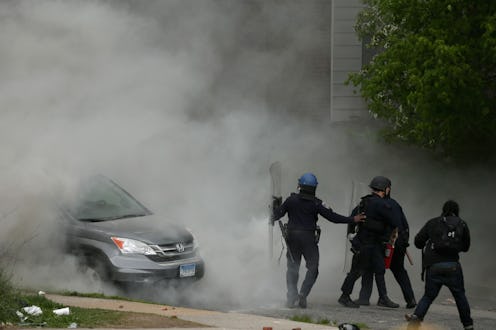News
Will Protests Continue In Baltimore?
The funeral of Freddie Gray on Monday, which laid to rest the 25-year-old who died while in police custody April 12, took the protests in Baltimore to fever pitch: While the city had been peacefully protesting the circumstances of Gray's death for days, Monday saw shops looted and officers attacked. The National Guard was promptly dispatched and a curfew imposed, and protests died down; more are planned for this coming weekend. However, on Friday, Baltimore prosecutors formally brought charges about the six officers involved in Gray's death, with charges ranging from assault to manslaughter to second-degree murder.
In her formal announcement, Mosby called for an end to violence and unrest in the city. “I’ve heard your calls for no justice, no peace," she told the crowd, which cheered in response to her announcement of the charges, the Daily Beast reported. "Your peace is sorely needed as I work to deliver justice.”
A number of rallies in honor of Freddie Gray were planned in Baltimore for the coming weekend, reports ABC 7. On Friday, these include a Baltimore United Coalition march and rally, a Baltimore Presbyterians prayer vigil, and a 300 Men March rally. On Saturday, a national rally has been planned by Malik Z. Shabazz, who helped organize the initial demonstrations over Freddie Gray's death in Baltimore; Shabazz is predicting 10,000 people will attend the rally. And on Sunday, a City Hall rally is planned.
So, will these rallies continue, even though one of the demands of protesters — that the six officers be brought to justice for their alleged role in the death of Freddie Gray on April 12 — has been partially met, with top prosecutor Marilyn Mosby noting publicly that Gray's death was ruled a homicide and that charges will be brought against the six officers who were present? In short, yes: The rallies and demonstrations aren't restricted to the case of Freddie Gray alone, but the specific circumstances that allowed this alleged homicide while in police custody to occur.
The institutional failure that, according to the protesters, led to Gray's death is not restricted to Baltimore, either. Protests spread to New York City and the District of Columbia later this week, as they did in aftermath of Michael Brown's death — and, after that, the lack of indictment in the case of officer Darren Wilson. Then, almost entirely nonviolent "Black Lives Matter" protests brought in tens of thousands calling attention to the far higher rate of black Americans dead at the hands of cops and the inequality faced by minority Americans across the board.
Even though charges have been brought against six officers, and promptly — thanks to the efforts of Baltimore state's attorney Marilyn Mosby — police officers more often walk free after being charged than not, and many have little faith that the charges will lead to a conviction or effect real change. For that reason, the protests will continue — because the structural inequalities that protests believe contibuted to Freddie Gray's death will not disappear because of these charges.
